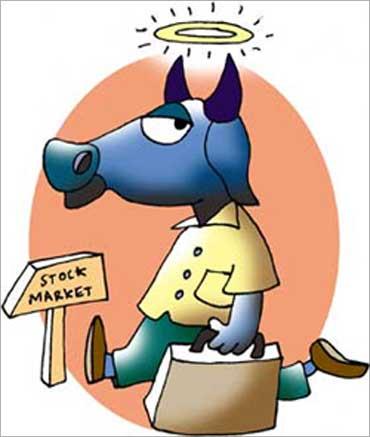Photographs: Rediff Archives Morningstar.in
Here are some scenarios when you should sell your investment.
It's rather unlikely that you will hold most investments forever. You will need to sell them from time to time. Having said that, it is important to sell an investment for the right reason. Furthermore, the reason should stem from your own investment philosophy and your investment-selection criteria.
In this article, we discuss some scenarios when selling an investment is justified.
1. The fundamentals of the investment change
It's often tough to distinguish between the normal fluctuations in a company's stock price or a fund's performance from long-term shifts in fundamentals. Let's say that because of a change in foreign exchange rates, an IT company earns a little less than analysts had expected in a given quarter; as a result, the stock's price takes a beating.
In such a scenario, there is no cause for concern since the company's long-term prospects haven't been impacted.
On the contrary, if the changes are deep enough i.e. the reasons you bought the investment no longer hold then you should consider selling. For instance, maybe you own a stock because the company is growing rapidly. But you find out about accounting irregularities at the company, which pull the rug out from under profits. You may still want to own the stock, but only if you're interested in turnarounds. It is no longer a growth stock.
The fundamentals can change with mutual funds too. Presumably, you buy a small cap fund because you want exposure to small cap stocks. If the manager starts buying large cap stocks, you may have a problem.
You may now have more than one large cap fund in your portfolio, and no small cap fund. You may need to sell to restore your original balance of styles.
Seven reasons to SELL an investment
Photographs: Rediff Archives
2. You made a mistake
Closely related to changing fundamentals are misunderstood fundamentals. If you buy a shirt that doesn't fit, you return it. Sometimes investments need to be returned too.
Let's take an example. Suppose a sector fund loses more than 40 per cent in a year since the sector it tracks hits a rough patch. Investors who failed to understand the investment proposition offered by a sector fund and believed they were investing in a 'low-risk' investment avenue should sell since they made a mistake.
Rather than hang on to a mistake in the hope it stays above water, it makes sense to switch the money to a more compelling investment that you feel comfortable with. The best way to avoid such situations, of course, is to be a finicky buyer. Research your investments thoroughly and then make investment decisions.
Seven reasons to SELL an investment
Photographs: Rediff Archives
3. The investment becomes too expensive according to your criteria
There's no reason an investment that has done well can't continue to do well. But when valuations rise, the investment's price is outpacing the business; say the P in the P/E ratio is rising faster than the E. If you invest in a stock or mutual fund -- not because you love the company or fund management but because the investment seems undervalued -- a rise in valuations may mean it's time to move on.
Unfortunately, there are no hard-and-fast rules on when an investment becomes too expensive. That's up to you to determine as part of your investment philosophy. Your investment advisor/financial planner should be equipped to aid you with this.
Seven reasons to SELL an investment
Photographs: Rediff Archives
4. Your portfolio needs rebalancing
Let's say you had a balanced portfolio at the end of 2002, with equal holdings in large and mid cap funds. By the end of 2007, your portfolio wouldn't have been even remotely as balanced. This is because mid cap funds outperformed large cap funds by a significant margin over that time frame.
Prudence demands spreading risks around, and that includes rebalancing a lopsided portfolio. For the sake of safety, it pays to periodically check to see if your portfolio is diversified across investment avenues of various styles. The diversification should further extend to asset classes and sectors. That often means selling some winners and investing the proceeds in losers.
Seven reasons to SELL an investment
Photographs: Rediff Archives
5. A better opportunity comes along
Suppose the stock of a great company that you have been keeping your eye on suddenly drops. When such 'too-good-to-pass-up' opportunities arise, it may make sense to sell some of the least-compelling parts of your portfolio to fund the purchase. Just be sure that the opportunity under consideration is well thought-out and investigated.
Also, it must fit your long-term investment goals, and meet the investment selection criteria you have laid out.
Seven reasons to SELL an investment
Photographs: Rediff Archives
6. The investment doesn't live up to expectations
While one year of underperformance may be nothing to worry about, two or three years of falling behind can get frustrating. Worse, if you are relying on the investment to offer a particular amount of return each year, on average, and it continually falls short, it may jeopardise your chances of meeting your financial goal.
However, before pulling the sell trigger, be sure that you are comparing the underperformer in your portfolio to an appropriate benchmark index and its industry peers.
Seven reasons to SELL an investment
Photographs: Rediff Archives
7. Your investment goals change
We don't invest to win some imaginary race, but to meet our financial goals. As your goals change, your investments should change as well. Suppose you start investing in a balanced fund with the goal of buying a car within the next five years. However, if you are promoted in your workplace and are allotted a company car, you may decide to use that money to plan for your retirement instead.
In that case, you might consider selling the balanced fund and instead, invest in a diversified equity fund. If your goal and investment horizon have changed, then the investment should also change.









Comment
article